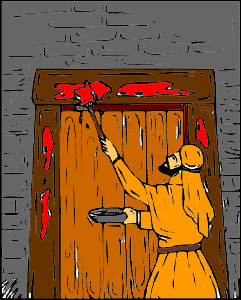The Significance of the Feast of Unleavened Bread
You shall also observe the Feast of Unleavened Bread, for on this very day I brought your hosts out of the land of Egypt; therefore you shall observe this day throughout your generations as a permanent ordinance... They baked the dough which they had brought out of Egypt into cakes of unleavened bread. For it had not become leavened, since they were driven out of Egypt and could not delay, nor had they prepared any provisions for themselves (Exodus 12:17,39).
The Israelites were to bake bread without leaven (i.e. the thing that causes bread to rise, usually yeast) and eat this bread for seven days (i.e. in the first month, from the evening of 14th day to the evening of 21st day). This was to be done as a memorial to God's deliverance of Israel from Egypt. The most significant aspect of this feast is the absence of leaven in the bread. Leavened bread takes longer to bake because one must wait for the bread to rise before eating it; however, unleavened bread can be baked and eaten right away since it is simply a flat wafer. Thus, the unleavened bread signified that Israel baked and ate quickly because their departure from Egypt was also in haste.
Do not eat it with bread made with yeast, but for seven days eat unleavened bread, the bread of affliction, because you left Egypt in haste—so that all the days of your life you may remember the time of your departure from Egypt (Deuteronomy 16:3).
The Feast of Unleavened Bread was celebrated concurrently with the Passover Festival (see explanation of its significance below):
This month shall be the beginning of months for you; it is to be the first month of the year to you... You shall keep it until the fourteenth day of the same month, then the whole assembly of the congregation of Israel is to kill it at twilight. Moreover, they shall take some of the blood and put it on the two doorposts and on the lintel of the houses in which they eat it. They shall eat the flesh that same night, roasted with fire, and they shall eat it with unleavened bread and bitter herbs (Genesis 12:6-8).
The Significance of the Passover Festival
And when your children say to you, ‘What does this rite mean to you?’ you shall say, ‘It is a Passover sacrifice to the Lord who passed over the houses of the sons of Israel in Egypt when He smote the Egyptians, but spared our homes.’” And the people bowed low and worshiped (Exodus 12:26-27).
 Each Israelite household was commanded to choose a one-year-old unblemished male lamb on the tenth day of the first month. Then, on the fourteenth day, the whole assembly of Israel was to slaughter the lambs at twilight (i.e. right after the sun sets). Then, they were to take some of the blood and put it on the two doorposts and on the lintel (i.e. top beam) of the house (see picture below), where they were gathered to eat the Passover lamb.
Each Israelite household was commanded to choose a one-year-old unblemished male lamb on the tenth day of the first month. Then, on the fourteenth day, the whole assembly of Israel was to slaughter the lambs at twilight (i.e. right after the sun sets). Then, they were to take some of the blood and put it on the two doorposts and on the lintel (i.e. top beam) of the house (see picture below), where they were gathered to eat the Passover lamb.
Just as an aside, it has been frequently preached that the Israelites applied the blood in the shape of a cross. As remarkable as this would be, it is not supported by the biblical text. I think it is sufficient to see a foreshadowing of the cross of Christ simply from the blood of the lamb, just as Jesus pointed out to his disciples when He celebrated the Passover with them (Luke 22:13-20; cf. John 1:29).
They were to roast the lamb over fire and eat it that very first evening, burning anything leftover, leaving nothing till the morning. Just like the significance of the unleavened bread, this meal was also to be taken with a representation of haste:
Now you shall eat it in this manner: with your loins girded, your sandals on your feet, and your staff in your hand; and you shall eat it in haste—it is the Lord’s Passover (Exodus 12:11).
But for this festival, the most significant aspect was in the blood. God would see the blood on the doorposts and on the lintel of a house and pass over that house when bringing death to all the firstborn:
The blood shall be a sign for you on the houses where you live; and when I see the blood I will pass over you, and no plague will befall you to destroy you when I strike the land of Egypt (Exodus 12:13).
Thus the name "Passover" comes from the fact that God "passed over" these homes of the Israelites when bringing the tenth and final plague against Egypt.
When Jesus came, He changed the meaning of some of the elements used in the Passover Festival, the practice of which changed by the time of the Second Temple (built by Zerubbabel, expanded by Herod). The two main elements, unleavened bread and the sacrificial lamb, were still a part of the festival. Wine also came to be added to the festival. All these elements represented Israel's redemption from slavery to Egypt; however, Jesus changed the meaning of Passover to be a representation of their redemption from sin through the offering of His own body (in the bread) and blood (in the wine) on the cross.
Today, Christians celebrate this new Passover as a New Covenant memorial to Christ's death on the cross for our sins. We variously call it Communion or the Lord's Supper.